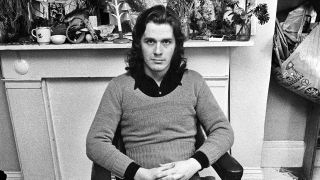John Wetton, the prodigiously gifted tenor vocalist, bass guitarist and songwriter, has lost a lengthy battle with colon cancer at the age of 67. Wetton performed with many of rock’s biggest and most important names, including King Crimson, UK, Roxy Music, Family, Uriah Heep and Wishbone Ash, while also maintaining a solo career and collaborating with Brian Eno.
However, it was as a co-founder of the post-prog-meets-AOR four-piece Asia that many will remember best. In forming that group, Wetton established a partnership with the former Buggles/Yes keyboard player Geoffrey Downes that would sell millions of records.
Born in the South Derbyshire town of Willington on June 12, 1949, John Kenneth Wetton grew up in Bournemouth. With a church organist brother and inspired by The Beatles, he learned to play piano and the bass guitar. He hooked up with several south coast bands, including The Corvettes, who included future King Crimson lyricist Richard Palmer-James. A community of local musicians, including Robert Fripp and Greg Lake, welcomed Wetton into their midst.
Later on he joined the progressive rock band Mogul Thrash, who recorded a self-titled album in 1971. Although the record sold reasonably well on the continent, a management dispute rendered the band’s future untenable. Out of that band and after playing a few shows with Renaissance, Wetton found himself another full-time gig with the band Family, replacing John Weider.
Family, fronted by irrepressible singer Roger Chapman, knew how to enjoy themselves, and Wetton remained with them for two albums: 1971’s Fearless and 1972’s Bandstand. Family were a great band, but Wetton realised there was a glass ceiling. “I was never going to break into that writing partnership between Chapman and Charlie Whitney [guitarist],” Wetton explained to Classic Rock later, “or to replace Roger as the lead singer.”

Once again it was time for the ambitious young Wetton to move on. This time it was to King Crimson, a band he had already been invited to join but had passed on for Family. Crimson were in a state of disarray, introducing no less than four newcomers (including a pair of drummers, Jamie Muir and former Yes man Bill Bruford), as well as Richard Palmer-James, who took the place of lyricist Pete Sinfield.
“In Crimson [I was allowed] to write and sing,” Wetton told Classic Rock in 1999. “I knew that Robert Fripp was in trouble; the previous band had fallen apart, they [the other band members] didn’t like him, and he knew that I was on his side. We’d known each other since we were fifteen and would still meet up and talk about music.”
Wetton also welcomed the idea of playing with what he called “two completely mad drummers. Jamie was a strange fish, but I loved him to death and he was an inspiration to Bill”.
This line-up recorded Larks’ Tongues In Aspic (1973), Starless And Bible Black (released a year later, by which time Muir had left to join a monastery) and 1974’s brilliant Red, all of which rank among the band’s most impressive.
“Jamie was never meant to be in a rock band, nor [violinist and occasional keyboard player] David Cross,” Wetton said. “But Bill [Bruford] and I were tough; we could play and we took no prisoners.”
Although Wetton had often said he “hoped to be in that band for twenty years,” his time in Crimson drew to a close in typically untidy fashion when Fripp ended the group. Red had been their lowest-charting album until that point, and out on the road Fripp had reached breaking point over the group’s increasing levels of volume and power.
“I was having a coffee in my flat when Robert called saying he wasn’t into it any more,” Wetton later recounted. “I didn’t see it coming, though I knew he was pissed off. He got pissed off about many things – the tour manager, fans, his pick. So I rang Bill, who told me: ‘I think it’s for real.’ I replied: ‘That’s a pisser.’”
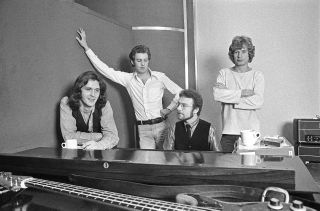
After that Wetton toured as the bassist with Roxy Music, contributing to the live album Viva!.
His career effectively on hold, he had no idea that another pivotal figure was about to enter his life. Following a show at the Santa Monica Civic Auditorium, he was approached by a diminutive stranger who invited him to lunch the next day.
During the meal, John Kalodner, a West Coast employee for Roxy’s label, Atlantic Records, demanded with typical brusqueness: “What the fuck are you doing? Get something together. Playing back‑up to Brian Ferry is not your destiny.”
“Kalodner gave me the biggest pep talk of all time,” Wetton told Classic Rock in 2001. “He believed I could be mega. I came out of that lunch feeling absolutely brilliant. We kept in contact, and each week he sent me things that could be useful, some classical, some rock.”
And so the quest to transform a sideman into a superstar began. Meanwhile, Wetton joined Uriah Heep for a year, playing on Return To Fantasy and High And Mighty but never quite settling. Bemoaning the group’s apparent lack of creative inspiration and the declining health of soon-to-be-sacked frontman David Byron, with whom he had bonded, he quit.
In 1977, Wetton formed the band UK with guitarist Allan Holdsworth, violin/keyboard player Eddie Jobson and old pal Bill Bruford. A three-year run was undermined by line-up changes, personality clashes and various gremlins, although they released two studio albums (UK and Danger Money) that are now viewed as cult classics. And yet Kalodner, Wetton’s mentor, remained unimpressed. So Wetton released a solo album, Caught In The Crossfire.
Next stop was Wishbone Ash, to whom Wetton claims to have offered some of the prototype material later recorded by Asia. Wishbone guitarist Andy Powell doesn’t remember things quite that way, although the situation was exacerbated by Wetton’s desire to become the lead singer. Either way, by the time the album, Number The Brave, was released, Trevor Bolder had taken over.
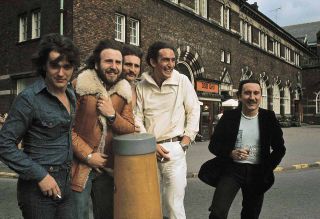
Finally, Kalodner arranged a meeting in Los Angeles. It was 1981 and the executive had joined Geffen Records. This was to be a triumphant time for both men. Before reviving the career of Aerosmith, among others, Kalodner focused upon his protégé of the past few years.
Money was no object for Geffen, who were signing stellar names like John Lennon and Elton John. Former Yes manager Brian Lane took on the project, putting forward the band’s guitarist Steve Howe, who in turn suggested Geoffrey Downes as keyboard player. And with Emerson, Lake & Palmer on hiatus, Carl Palmer became the drummer.
“Geoff and I hit it off immediately,” Wetton later recalled. “It was like a runaway train. If we didn’t write three hits in a day,we were disappointed.”
With the MTV boom under way, Asia’s timing could not have been better. Their slimmed-down, glossy reboot of the music of the 1970s was embraced so heartily that even the band members were astonished.
“Prog was still deep inside of us, but we sliced away the fat,” Wetton told the first issue of CR’s sister magazine, Prog. “We took our twelve-minute songs and removed the ten minutes of noodling. The ingredients we’d grown up with were kept, but we transposed them into a more succinct setting.”
Asia’s self-titled debut album sold more than 10 million copies and topped the US chart for nine weeks. “John and I were driving somewhere in the States and Heat Of The Moment came on the radio. We hopped stations and it was there on another one,” Downes marvelled.
However, Asia’s huge success meant its follow‑up, Alpha, was rushed. Howe, who was feeling excluded from the writing, wouldn’t be around much longer. Astonishingly, Wetton too was removed, and replaced by Greg Lake for a televised Japanese show that drew over 20 million US viewers. He later agreed to return – as long as Howe was axed.
“Steve had squeezed me out of the band, so I did the same to him,” Wetton sighed, adding: “I lived to regret that decision, but I wanted my toy back and I was prepared to do anything.”
Rushed it might have been, but Alpha sold three million copies. Howe was replaced by former Krokus guitarist Mandy Meyer for a third album, 1985’s Astra, by which point Geffen’s priorities had changed. So did Asia’s line-up – often. Wetton reached the end of the line in March 1991 at a gig in Rio de Janeiro. While pouring out his heart in the ballad The Smile Has Left Your Eyes, a fan threw him the heavy metal devil salute.
“I thought: ‘Oh no. There has to be another way,’” Wetton told Classic Rock in 2001. “We had become a tribute band. I knew I had to write new stuff, seek a much more personal viewpoint on everything. That’s what I’ve done ever since.”
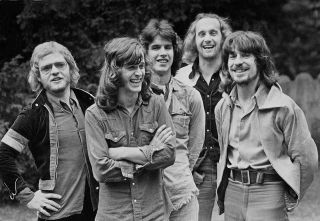
Downes, who continued the Asia name for a string of albums, and Wetton remained estranged for many years. Things reached a new low when Wetton dismissed his successor in Asia, John Payne, as a “crap singer. I don’t like him”.
Save for joining Palmer in the short-lived budget supergroup Qango, Wetton resumed his solo career, making some great – if dismally underappreciated – music: 1994’s Voice Mail (also known as Battle Lines) which featured Fripp, Steve Lukather and drummer Simon Phillips, followed three years later by Arkangel and then Sinister (2000).
Wetton had become skilled at spotting and nurturing rising talent, and brought John Mitchell of It Bites/Frost* fame, and David Kilminster, later a guitarist for Roger Waters and Steven Wilson, into his bands.
Excessive drinking was now endangering both Wetton’s career and his health.
Fences were mended with Downes in 2003 when he contributed two songs to Wetton’s Rock Of Faith album, before forming the duo iCon. The next logical step, reuniting the original Asia, became possible after Wetton gained sobriety.
“Because of his drinking, I went into things with trepidation,” Palmer admitted at the time. “I felt it was a stupid, stupid idea – until the four of us met again. John had changed so much – he had everything back together in his life. Now he wanted his band.”
Wetton understood how he had infuriated the others, admitting: “Oh God, yes. I was absolutely awful. Sometimes you couldn’t get a coherent word out of me after nine o’clock in the morning.”
Asia went on to record four further studio records. And although Howe left in 2013 the members established genuine, mature friendships. “I’m happy to say that we no longer live in prams,” Wetton once joked.
“It’s not uncommon for the four of us to breakfast together,” Downes told Prog in 2009. “In the old days, with all the egos, we’d have been in different hotels…”
“…in different cities,” Wetton added, deadpan.
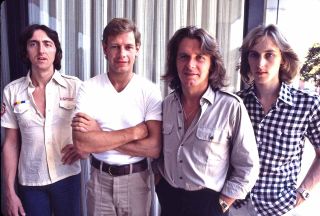
Despite suffering a heart attack in 2007 and being diagnosed with cancer three years ago, Wetton kept busy. There were plans for a new Asia album and he was part of the sporadic reunions of the band UK. Away from music, after more than a decade of sobriety, he volunteered time to share his experience, strength and hope with other alcoholics.
Wetton died three weeks after announcing he was pulling out of Asia’s forthcoming US tour with Journey in order to undergo chemotherapy, delegating his role to his good friend Billy Sherwood.
An emotional and shocked Geoffrey Downes spoke of himself and Wetton becoming “as close as two non-related brothers could be”, adding: “John’s bass playing was revolutionary, his voice was from the gods, his compositions out of this world and his sense of melody and harmony unreal. He was literally a ‘special one’.”
“The world loses yet another musical giant – a gentle person who created some of the most lasting melodies and lyrics in modern popular music,” wrote Carl Palmer. “His ability to triumph over alcohol abuse made him an inspiration to many who have also fought that battle.”
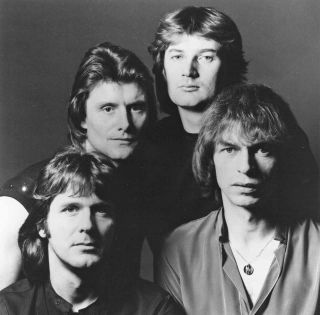
Elaborating on that last point, John Mitchell says: “Perhaps JW’s greatest achievement was beating his own personal demons. We often spoke at great length about alcoholism, as it had killed my own father, and he recognised that full-circle nature in our relationship. What began as merely a ‘gig’ became a deep friendship, whether or not we were involved musically at the time. He trusted me and I trusted him, implicitly so.”
Wetton had remained in contact with Fripp, who after his friend’s death hailed Wetton as “for me, the leading bass player of his generation”, and revealed a series of beautiful, bittersweet email exchanges between the two of them. In one, Fripp wrote: “I don’t have much in the way of happy memories from the first 45 years of KC, but there is a certain something I feel for our time together in 1973-74 that isn’t quite nostalgia; and you are probably the only person I can now discuss it with.”
As the tributes, just a few of many, on this page confirm, Wetton was loved and respected by many fellow musicians. Eric Clapton made a poignant contribution by posting a clip of himself playing How High The Moon by Nancy Hamilton and Morgan Lewis, with the dedication: “For John W…” And during their show on the recent Cruise To The Edge, Yes performed Heat Of The Moment in honour of Wetton.

Tributes
“Our birthdays just two days apart and having grown up in England a short distance from each other, John and I shared a special bond. He was a talented musician with a powerful voice and presence, also a genuine friend.”
Alan White, Yes
“John visited Yes backstage in Brighton on our last UK tour. He had been fighting the battle of his life for a while now but his smile lit up the room, his spirit was strong as ever and grace shone in his eyes. I never imagined it would be the last time I’d see him.”
Billy Sherwood, Yes
“John was a super-talented man, also a good friend. He leaves behind a wealth of music and wonderful songs. I’m devastated.”
Mick Box, Uriah Heep
“I am still shaking over the news. Of all the musical attributes John brought to his short time in Heep, my favourite was his sense of arrangement. I learned a lot from that. I hope he is in heaven so we can one day catch up.”
Ken Hensley, ex-Uriah Heep
“Treble and bass. RIP my friend.”
Sam Coulson, Asia
“John joined us for Number The Brave, displaying his prodigious musical skills. I think of those days whilst sending condolences to his family.”
Andy Powell, Wishbone Ash
“Not only was John a wonderful singer and musician, he was also an incredibly warm person and a particularly special pal. I loved him like a brother. I’m totally gutted.”
Steve Hackett
“Bugger! I was honoured to call John a pal.”
Jakko Jakszyk, King Crimson
“My first ever tour was with the John Wetton Band in Japan almost 20 years ago. John gave me my very first break, and, to quote one of his favourite songs, ‘God only knows where I’d be without you.’”
David Kilminster, former solo bandmate
“Working together was a privilege. John was often a tortured soul and and I’m so pleased that he had the strong support of Geoff [Downes], John [Mitchell], Lisa [his wife], Martin [Darvill] and others through the years.”
John Young, former Asia player and solo bandmate
12 Of The Best from John Wetton
